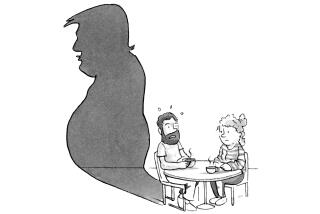Space Invaders : Americans, an Observer Abroad Reports, Do Not Respect Personal Boundaries, Perhaps Because We Imagine Ourselves Pioneers Roaming the Open Frontier
- Share via
MY FRIEND Jim Moore, who has been sojourning for a year in England, writes to explain how he feels about space.
In America, he says, one has space; in England, one does not.
Moore has simply made an observation that has been plain to all us Colonials from the beginning, but he has discovered it in reverse; he has discovered what it is like to find oneself living in a smaller world.
Moore lives in Cambridge in an apartment with his wife, Suzon. As former head of the English Literature department at Mt. San Antonio College, he has adapted quite easily to that academic setting.
Recently Moore threw his back out trying to make some household repairs and was obliged to take to his easy chair, which inspired reflection.
It occurred to him, among other things, that he now takes up less space than he used to. “I don’t mean avoirdupois, but rather the space one takes up, psychologically and physically, in respect to the world around one.
“Part of this change,” he concedes, “relates to retirement or changing occupation. In doing research on Anglo-American musical theater and in writing, as well as in ripping off wallpaper and supervising jolly workmen, I pretty much stay in one place; I used to roar about a campus, drive willy-nilly across the L.A. metropolitan area, be a presence in many groups, and now I’m just not. I begin to understand a little better some of the Thoreau I used to pound into students’ heads.”
Moore says he can recognize Americans on English walks. Their stride is longer, they swing their arms. In bookstores they back into other shoppers and lurch into others on trains.
Britons don’t do that, he says. Respecting the density of their country, they tend to protect their personal boundaries, and those of others. In a crowd, they are always careful not to make contact.
“Americans clog up the pavement and make it hard for everyone else. Somehow, over the year, I have discovered how to make myself smaller.”
Moore also notes that he feels closer to his neighbors. In Claremont, their house was 30 feet from the sidewalk. The only people who knocked at the door had been invited. “Here, the pavement is directly outside our bay window. Neighbors knock on the door with regularity. In fact, we all have each others’ house keys. That never happened in Claremont.”
Two other facts of Moore’s new life appeal to me. There is no such thing as junk mail (the British are apprehensive that, like everything else American, it will soon overwhelm them), and Suzon’s garden is full of lavender, marigolds, roses, sweet peas, hollyhocks and bumblebees.
I can understand Moore’s feeling that his world has grown smaller. But perhaps his notion that we have more space in America is an illusion--a part of the American myth.
I watched an old Western on TV the other night, wondering why. I realized that we love Westerns because we are tranquilized by those sweeping vistas of the Old West. It was this openness that brought us here. The country unrolled before us all the way to the Pacific. It was vulnerable and free. All we had to do was take it away from the Indians.
How many times have we heard Gary Cooper, looking out over a barren range, say, “Someday there’s gonna be a city out there.”
Even when Los Angeles became a metropolis, that feeling of unlimited space prevailed. New Yorkers scoffed at our houses and yards, observing that we built fences to keep our neighbors out. But how many New Yorkers knew the tenants of apartments next door, except by the sound of their plumbing?
The country is still vast, but we keep crowding into the cities. Small farm towns are dying. The plains are probably less populated than they were a century ago.
One needs only to fly cross-country in a jet to see how much undeveloped land there still is. Large as they are, the cities seem like small oases in a desert. They are magnets that drain the hinterlands. How you gonna keep ‘em down on the farm, once they’ve seen the Hollywood sign on TV?
Perhaps we must learn, like the British, to respect each other’s space. Recent freeway shootings suggest that Americans can not bear overcrowding.
Moore is not unaware of Britain’s growing stress. He recalls the primitive behavior of British soccer fans, and the recent, as he calls it, “American-style” random mass killing.
“Britain is rushing toward the future almost as rapidly as America is,” he says, “so if we think we have stepped backward a couple of decades, it won’t be too long before it’s 1987 here.”
As long as they don’t have junk mail, there’ll always be an England.
More to Read
The biggest entertainment stories
Get our big stories about Hollywood, film, television, music, arts, culture and more right in your inbox as soon as they publish.
You may occasionally receive promotional content from the Los Angeles Times.










